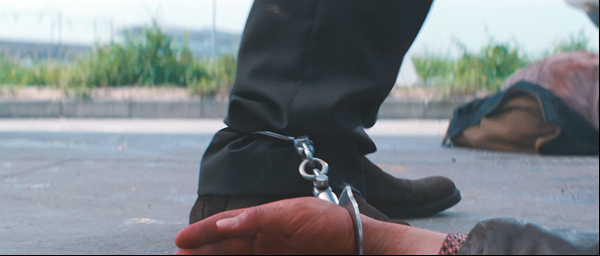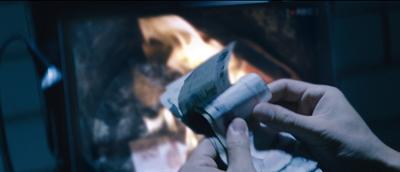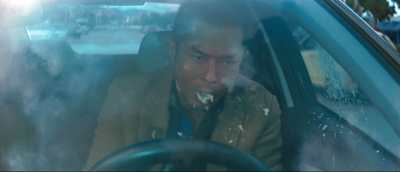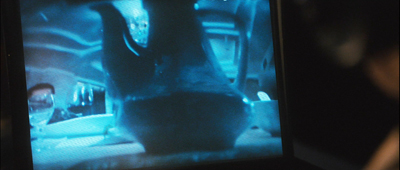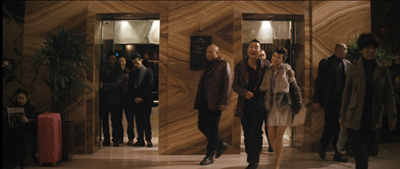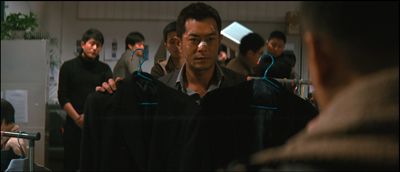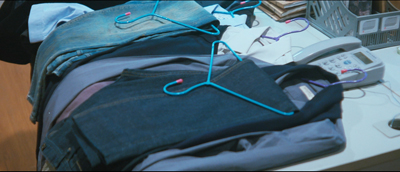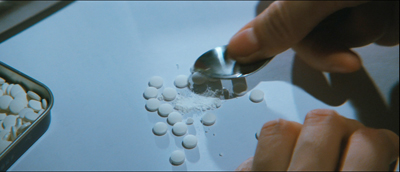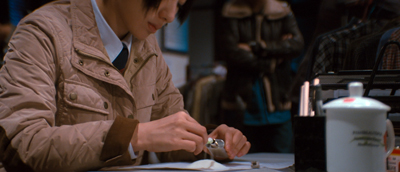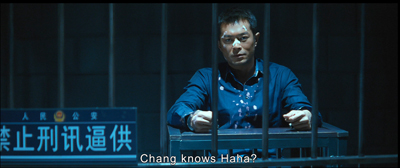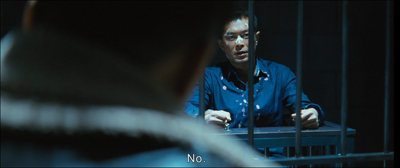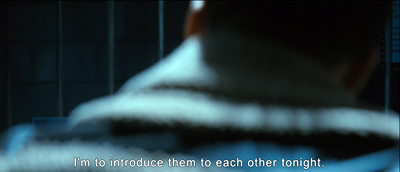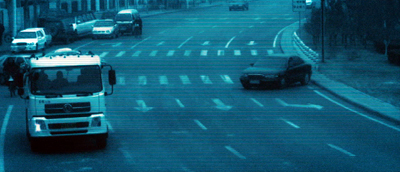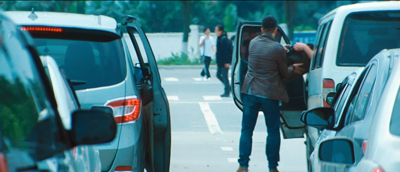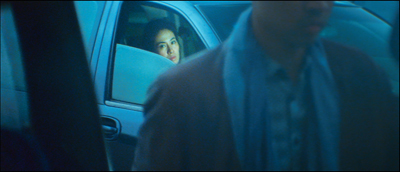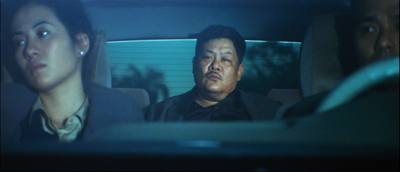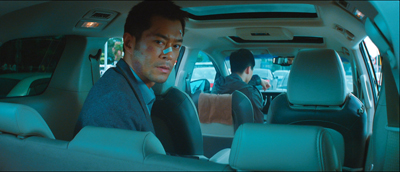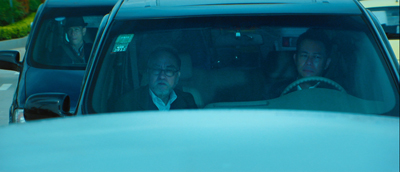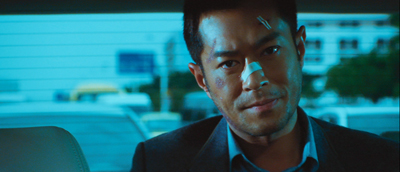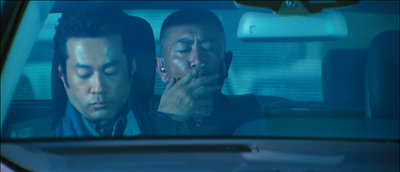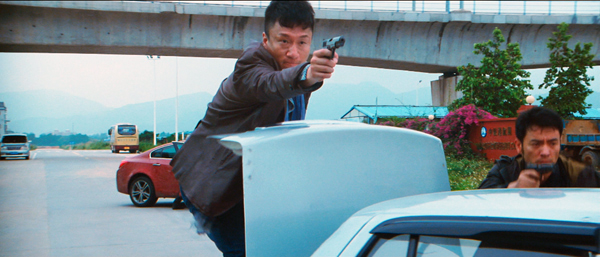Mixing business with pleasure: Johnnie To’s DRUG WAR
Monday | July 8, 2013 open printable version
open printable version
Drug War (2012).
DB here:
At first glance, Drug War (2012) seems an unusual film for Johnnie To Kei-fung and his Milkyway Image company to make. For one thing, this Mainland production lacks the surface sheen of To’s Hong Kong projects. Shot in wintry Jinhai, a northern port city, and in the central city of Erzhou, it presents stretches of industrial wasteland and bleak superhighways. As a result, To’s characteristic audacious stylization gives way to a bare-bones look. The saturated palette of The Longest Nite (1998) and A Hero Never Dies (1998) is gone, replaced by metallic grays and frosty blues. Hong Kong heartthrob Louis Koo, rapidly becoming To’s jeune premier, is bluntly deglamorized—first glimpsed spewing foam as he tries to steer his car, then moving through the film with a blistered face and a bandaged nose. The noir-flavored Exiled (2006) made its steamy Macau locales seem exquisitely somber and menacing, but Drug War’s early scenes in a hospital have a mundane, documentary quality. Little in To’s earlier work prepares us for the grubby scene of drug mules groaning as they shit out plastic pods of dope.
Of course it’s a crime story, the genre in which To and his writer-producer collaborator Wai Ka-fai have gained most acclaim. More specifically, it’s a police procedural, a mode they have worked skillfully with Expect the Unexpected (1999) and Mad Detective (2007). Those, like most cop movies, thread the personal lives of the investigators into the cases they’re running. Drug War, though, gives us no glimpse of the cops off-duty. The result presents our officers as strictly business: no wives, kids, or civilian pals distract them from their mission. In this respect, the film’s closest analogue is probably PTU (2003), but even that showed its patrolling cops in more camaraderie and clashes than we get here.
True, there are brief moments of comradeship, as when Yang offers money to help the cops from Erzhou, and her colleagues chip in. A marvelous shot juxtaposes one cop’s cash with the video stream of the burning bills in the ceremony honoring Timmy’s dead wife and her brothers.
Yet the result humanizes the crooks more than the cops. Timmy mourns his family; we don’t know if Captain Zhang has one.
The concentration on routine and tactics is due partly to the action’s compressed time frame: the seventy-two hour pursuit of the drug gang permits no rest. In addition, made chiefly for the Mainland audience (with Mainland funding), Drug War was subject to censorship that’s more stringent than that in Hong Kong. It may be that To, Wai, and their screenwriting team were cautious about integrating personal lives into their plot. Exploring the officers’ off-duty frailties and failures might have made censors fret. And of course the emphasis on selfless officers sacrificing their personal lives sends a positive ideological message.
I think that the film benefits in other ways from skipping what Ross Chen calls “cop soap opera” and focusing relentlessly on the central cat-and-mouse game. Zhang’s investigation becomes engaging for us thanks to well-honed Milkyway narrative maneuvers: a focus on suspenseful strategies and unexpected countermeasures, the weaving together of various destinies, a fascination with doubling and mirroring, surprising genre tweaks, and unusually laconic signaling of story information. Beneath its drab, almost generic surface and its apparently prosaic account of police procedure, Drug War offers a typically engrossing, off-center Milkyway experience.
And yes, gunfights are involved. But even those are not quite business as usual.
Live or die, I’ll be with you
After a prologue in which a vomiting Timmy Choi Tin-ming crashes his car into a restaurant, we see several lines of action converging at a highway tollbooth. A truck driven by two drug-addled men pulls through, followed by two more men in a muddy red sedan. Soon an overheating bus pulls up. Panicking, the drug traffickers inside make a run for it before they’re brought down by highway officers and Captain Zhang Lei, who has been working undercover on the bus. The mules are taken to a hospital—the second convergence point—and there Captain Zhang notices that Timmy, borne by on a gurney, has burns typical of a drug explosion. Zhang and female officer Yang Xiaobei visit the site of Timmy’s crash, where they find his cellphone. Its mysterious call queue launches their investigation.
If you haven’t yet seen the film, I hope that the preceding has whetted your interest. From now on, I’m afraid I must indulge in what we in the trade call spoilers.
The tollbooth confrontation, it turns out, is a sting operation by which Zhang can nab the traffickers he has infiltrated. The truckers who pass through at the same time are bringing ingredients for Timmy Choi’s local meth factory, and the red sedan is carrying cops who’ve been tracking them. When Zhang and Yang find Timmy’s cellphone, they find dozens of missed calls from the truck drivers, and this enables them to connect Timmy with the shipment. His lab has exploded, killing his wife and her brothers. He escaped but suffered the burns and nausea we saw at the outset.
To escape the death penalty Timmy offers to turn snitch. The rest of the film will intercut among various lines of action: the truckers and their pursuers, the cops using CCTV cameras to track the crooks, and Zhang’s efforts to use Timmy to infiltrate the ring. Zhang’s strategy takes him up the chain of command. There is the laughing Jinhai smuggler HaHa and his wife, who are trying to become drug distributors by means of the port they control. They are wooing the cokehead Li Suchang, his superior Uncle Bill Li, and the real bosses, a Hong Kong gang headed by Fatso (Milkyway regular Lam Suet). Timmy, who knows them all, is positioned as go-between. As with many Hong Kong films, a hierarchy of villains permits a cascade of meetings, showdowns, chases, and chance encounters. Through it all, the question persists: Can Zhang trust Timmy to stay bought?
The first third of the film centers on Zhang’s daring scheme to penetrate the gang. Since HaHa and Li Suchang (called Chang in the English subtitles) have never seen one another, he forces Timmy to set up two meetings. The meetings are timed so that Zhang can impersonate Li in the first meeting and then play HaHa in the second. The result is a pair of virtuoso scenes I’ll go into shortly.
The central chunk of the film follows Timmy’s efforts to get a fresh load of dope for Zhang’s deal. His source is another of his factories, this one staffed by a family of deaf-mutes (a typically perverse Milkyway genre tweak). This section culminates in two intercut police raids: one, a painless seizure of HaHa and his wife, the other a bloody shootout in the factory. The two mutes in charge escape through a hidden passageway, a ploy that renews Zhang’s distrust of Timmy. Timmy vows that he didn’t know about the escape hatch.
The film’s final third introduces the Hong Kong gang directing Uncle Bill from behind the scenes. The film’s first two sections have emphasized the cops’ ability to track the gang with public surveillance cameras and minicams secreted in hotel suites and in the meth warehouse. Now we learn that the gang has its own technology. Hidden microphones and wireless recorders allow gang members to listen to conversations. Fatso feeds dialogue to Uncle Bill in his negotations with Zhang/HaHa. In their final rendezvous at a nightclub, Zhang discovers the ruse and uses it as an excuse to finalize the deal. But when the Hong Kongers demand a night out just for themselves, Captain Zhang must let Timmy go off with them and trust him to deliver them to him the next day.
Timmy betrays everyone. At the climax all the forces in play converge once more, this time outside a primary school. Cars bearing police surround the vehicles carrying the gang. Even the truckers are summoned by Timmy, and eventually the deaf-mutes show up too. Timmy tears off the wire he’s wearing, tells the gang that it’s an ambush, and launches an all-out firefight. While cops and crooks blast each other, Timmy slips into a school bus to hide from the barrage.
The gang is cut down, but so too are the police, including Yang. Even our protagonist Zhang is fatally wounded. Hong Kong aficionados will find here echoes of the pitiless climax of another Milkyway policier I probably should not specify.
The film’s epilogue, like the prologue, centers on Timmy in extremis. In prison he’s strapped down for lethal injection while he babbles the name of every dealer he knows, hoping somehow to save himself from execution. He fails.
Perhaps the most memorable image in the film’s final moments comes a bit earlier, at the end of the gun battle. Timmy brutally finishes off Captain Zhang, only to discover that Zhang has handcuffed his wrist to Timmy’s ankle. Timmy is captured frantically dragging Zhang’s corpse around the street, fulfilling Zhang’s warning after the ill-fated factory raid: “Live or die, I’ll be with you.”
Playing parts
Within this broad movement toward giving Timmy his punishment, at horrendous cost to the forces of law, To and Wai have built fine-grained scenes that swerve the conventions of cop movies in typical Milkway directions. The chief example involves large-scale repetition. During the first section, Zhang goes undercover, pretending to be a gang member. The subterfuge is given a twist: Zhang impersonates Li Suchang in his meeting with HaHa, then he impersonates HaHa in his meeting with Suchang. Once more a Milkyway film finds tricky drama in symmetry and doubling.
The first impersonation goes more easily, but it gets a healthy dose of suspense. Zhang plays Li Suchang as a cold, impassive negotiator. He barely speaks in response to HaHa, who lives up to his name by supplying a stream of chatter and guffaws. He’s not as dense as he might appear, but Zhang has little trouble intimidating him. The problem is that the mini video camera hidden in Zhang/Li’s cigar case is first blocked by food on the table and then arouses the curiosity of HaHa. The tension rises as HaHa examines the case, but Timmy nonchalantly rescues it. His intervention reinforces our sense, in this stretch of the film, that he is cooperating smoothly with the police sting.
Once the charade is over, the film’s narration increases the suspense by the tight timing of the next meeting, which takes place only minutes after the first. Zhang and Yang, who will be playing HaHa’s wife, must change clothes swiftly and prepare cameras to record the deal. The real Li Suchang goes upstairs with Zhang and Timmy just as the real HaHa and wife saunter out of the other elevator: The shot sums up the charade Zhang has engineered, as well as the plot’s mirror structure.
The second encounter ratchets up the tension. Zhang and Yang imitate HaHa and his wife, whom they’ve watched moments earlier; they even repeat lines spoken by the real couple in the previous scene. But Li Suchang is a more aggressive bargainer than HaHa and offers Zhang/HaHa some cocaine. The real HaHa claimed never to have touched the drug, so Zhang/HaHa declines. But Li insists, so the policeman must snort a line. This induces a good deal of uneasiness, which is upped when Li insists he take another hit. Zhang/HaHa obliges and becomes woozy. When Li demands that he snort a third line, Timmy again intervenes and asks that they proceed with the deal. Li relents and they make an appointment with Uncle Bill.
After Li Suchang leaves, there follows a chilling scene in which Zhang goes into drug shock, collapsing to the floor and twitching frantically. Timmy explains what the other cops must do to save him, and by following his commands they revive Zhang. Again Timmy seems firmly on the side of the police. But Zhang still wonders: Did Timmy secretly signal to Li? His mistrust will expand when the deaf-mute factory workers elude the police through an exit that Timmy didn’t mention.
The motif of doubling, a To/Wai staple, runs through the movie: two truckers, two cops tailing them, two deaf-mute killers, two raids, two traffic encounters with the gang, two times that Zhang must trust Tommy and release him. Even the climax consists of not one but two gun battles, the first in front of the school, the second in a nearby street. But the scenes in which Zhang plays both parties in a drug deal serve as the most audacious instance, and a fine example of Milkyway’s gift for reimagining basic conventions of the crime film.
Milkyway’s rule of one
In Planet Hong Kong 2.0, as well as in my discussion of Mad Detective on this site, I suggest that despite all this obsessive doubling, Milkyway films tend to refuse the redundancy that crime movies usually demand.
One instance is the gradual revelation that in the opening, the bus overheating at the toll booth is part of a police trap. Not only is Zhang aboard (sporting a Stetson), but the ticket taker is Officer Yang and the driver (merely glimpsed) is one of Zhang’s men. Since the incident isn’t referred to as a sting afterward, we must realize on our own that this sequence furnishes an abrupt introduction to the police unit’s efficiency and farsightedness.
Another instance is a little less cryptic but has longer-term consequences. The police are preparing for the double masquerade, and Zhang lets Timmy pick out appropriate outfits for them to wear. In a scene lasting only forty-five seconds and ten shots, the emphasis is on Timmy’s careful selection of suits—presented, as we might expect, in imagery of pairing.
While this preparation is going forward, To inserts a shot of hands crushing aspirin tablets into powder.
Later we see that Officer Yang is filling a flask with the powdered aspirin.
What’s going on here? Another sort of film would have inserted dialogue something like this: HaHa hasn’t met Li Suchang, but he’s probably heard that he’s a druggie. He’ll expect me to use coke. If he offers, I’ll tell him that I use only my own. We’ll prepare some fake stuff for me to bring in a flask. And this would have been a clear setup for what will in fact happen in the first meeting. But we don’t get such a setup. Moreover, at this point Yang’s action is even more cryptic because we don’t yet know about Suchang’s addiction, which Zhang is planning to mimic. Yang is preparing a protective measure against a threat we will only learn of later.
The Milkyway writing team often treats story points in this peremptory way. If the Hollywood rule is “Tell the audience every major point three times,” To and Wai often assume that one mention is enough, and even that can come before we’re in a position to appreciate it. Indeed, Zhang’s scam depends completely on the fact that HaHa and Suchang have never met, but that premise is told us on only one occasion, and it’s not given much emphasis.
Again, we could play Hollywood scriptwriters and let Zhang and Yang huddle to explain how they will exploit the fact that the two gangsters can’t recognize each other. But the Milkyway team skips all that. The plan is devised offscreen. We next see Zhang and Timmy picking their wardrobe and Yang preparing the phony cocaine.
In the prologue, we have gotten another roundabout piece of foreshadowing. As Timmy’s car careens down the street, a single shot is presented as the view of a surveillance camera.
A more orthodox film would then cut to a Network Operations Center where concerned officials are watching traffic. But To simply cuts back to the car, where Timmy’s cellphone falls to the floor. Only after Timmy becomes a person of interest to the police do we see investigators re-running CCTV footage of the car. The one video shot has been a hint about how the police will build up their knowledge of Timmy. More broadly, it prefigures the importance of police video surveillance of the gang throughout the film.
Most laconic of all, I think, is the rather complicated scene taking place at a traffic light. The transfer of an important valise, containing money or drugs, is one of the most hoary conventions of the cop thriller. Director To makes it the occasion of a crisscrossing geometry and barely noticeable hints about Timmy’s ultimate aims.
Waiting at the light on the way to a meeting, Zhang as HaHa gets a call from Suchang and Uncle Bill, in a Mercedes sedan waiting behind them. There’ll be no meeting; a deal will be done right here. Zhang’s team is spread out in other vehicles backed up at the light.
But when Zhang as HaHa picks up a parcel to deliver to a white van further along the line of cars, To’s camera coasts rightward to show a dark van waiting in the next lane. We aren’t shown who’s in it. Soon, as Zhang transfers the bag to the van, we see yet another vehicle at the front of the line, and over his shoulder we see a woman inside.
Cut to inside that vehicle, where the woman, the driver, and a fat man in the back seat sit impassively.
Within the plot, the scene functions as Bill Li’s effort to determine whether he’s being set up. The transfer turns out to be a fake, aiming to confirm that Timmy has not turned snitch. If his associates are undercover cops, they are likely to reveal themselves here in order to make a bust. That would fail, because the bag Zhang ends up with carries only imported cigars.
Beyond its function as a test, the traffic stop plays a crucial narrational role. Through mere glimpses and without anything being prepared for, we’re introduced to the Hong Kong gang that will play a commanding role in the last third of the film. The subterfuge is that we haven’t yet been told that there is such a gang; at this point, they are simply oddly emphasized passengers in adjacent vehicles. A more traditional plot would have included an earlier scene in which the police identify the Hong Kong suspects and provide their backstory. Then, seeing them at the intersection would satisfy us that we were putting the story together. Instead, working with almost no dialogue, using the traffic backup as another convergence point, To and Wai have evoked a strange uneasiness. Who are these people, and why are we seeing them?
Immediately after these shots of adjacent vehicles, another dark van opens and a passenger sets a carrying case on the street. Yang in her guise of HaHa’s wife fetches that case. Then, in a slippery set of POV shots, Timmy turns and looks back at other men in vehicles, and then at Uncle Bill and Li Suchang, who seem to evade his stare.
Why dwell on Timmy at the height of the scene? For the first time we can study his reactions when his captors aren’t watching him. His calculating stare suggests that he knows, well before the police do, that the deal is a sham. He realizes that if the cops do take the bait and reveal themselves, only he will pay the price. Now he knows that he can’t count on the gang and that he’s on his own. At the climax he’ll take his revenge on both sides by halting the motorcade before it reaches the port, where cops are poised to arrest the gang. That will provoke the final shootout—which, like this scene, involves all the principals confronting one another in vehicles on the street.
This is a lot to load onto a brief, silent exchange of looks, but it’s typical of To and Wai’s glancing exposition. Another director would have provided stronger clues to what’s going on in Timmy’s mind, perhaps through flashbacks or voice-over. Yet that tactic would depend on our knowing who the people in the other cars are. Only later, before the meeting at HaHa’s port, will Timmy identify them. He will spill this information very quickly. And just once.
Since its founding in 1996, Milkyway Image has responded adroitly to changes in the regional film industry. For their local audience, To and Wai have created popular comedies, off-kilter thrillers, and unclassifiable items like Running on Karma (2003) and Throw Down (2004). They have occasionally completed coproductions with Europe (Vengeance, 2009) and an Asian branch of Hollywood (Turn Left, Turn Right, 2003). They have adjusted to the soaring Mainland market, even revising Breaking News (2004) to suit the censors. Just as a string of Milkyway romantic comedies yielded some financial stability in the 2000s Hong Kong market, more recent efforts like Don’t Go Breaking My Heart (2011) and Romancing in Thin Air (2012) have given the company a foothold in the PRC.
Yet Milkyway takes chances too. Election 2 (2006) surprised everyone with its bold acknowledgement of Triad networks on the Mainland; neither it nor its predecessor was shown theatrically there. Drug War has attracted notice among international critics for its frank treatment of the PRC underworld. To and Wai seem to find unusual opportunities in every project. Here, making Hong Kong gangsters the ultimate villains suggests that the pestilence comes primarily from elsewhere. At the same time, giving Timmy and the Hong Kong gang such prominence permits casting some of the Milkyway repertory company, familiar actors not only in Hong Kong and the Mainland but also in the international market.
Johnnie To, it seems, can zigzag his way to creative achievement in different circumstances. He and Wai are keeping Hong Kong cinema alive in unpromising times and finding new narrative resources in a genre that often seems played out. Their latest, Blind Detective (2013), is receiving pretty unfavorable notices, but this long, preposterous semi-comedy is, I expect, another symptom of the sidewinding strategy that characterizes their work.
With Milkyway, adventurous exploration of cinema is also a business plan. Catch them if you can.
Thanks to Geoff Gardner, Athena Tsui, Li Cheuk-to, To Kei-chi of Milkyway Image, and Crystal Decker of Well Go USA for their assistance in preparing this entry.
For a sensitive discussion of the film’s treatment of China, see Kozo’s review at LoveHKFilm.
Drug War performed sturdily at the Hong Kong box office (over US $600,000) but did really well in China, garnering upward of $23 million during its April release. Well Go and Variance open Drug War on 26 July for a US theatrical run. Before that it’s playing several festivals, including the mammoth TIFF Chinese series on 14 July. Mr. To will introduce the TIFF screening. The day before, 13 July, he will be present for a conversation.
Milkyway plots often rely on converging destinies, of character trajectories intersecting through chance. This principle is less pronounced in Drug War, except for the moments when the two truckers and the two deaf-mutes unexpectedly hook into the main plotline. Accidental convergence, often pointing up parallels among the characters, is clearer in A Hero Never Dies (1998) and Life without Principle (2011). I discuss the first film in Planet Hong Kong 2.0, the other in this entry.
P.S. later 8 June: Today you get double value. Grady Hendrix, Hong Kong film expert and one force behind Subway Cinema, writes with this thoughtful interpretation of Drug War–which makes it seem as daring thematically as it is in its narrative strategies.
For me, the most interesting element is the long game that I think To and Wai are playing and what I see as the secret heart of the movie. I think that the meaning of the film isn’t conveyed so much by the narrative as by the tools used to create the narrative: the actors. All of the cops are Mainland actors, most of the drug dealers are Hong Kong actors. What are drug dealers besides capitalism run amuck, completely unregulated? What are cops but authoritarian impulses, completely unregulated? The two groups have similar goals: make money at all costs; catch the criminals at all costs.
The cops in the film are China personified: they have unlimited resources, massive numbers, infinite organization, but they are heartless towards outsiders, unforgiving, and they don’t trust anyone. The criminals are all the stereotypes of Hong Kong-ers: they are family, they are stylish and chic, they eat meals together (Hong Kong people love to eat, after all) but they are only interested in money. They will save themselves and leave their wives to die, they will betray anyone (including their uncle and godfather), to make a buck. Both groups use the same tools, but they are opposites: unregulated capitalism vs. unregulated authoritarianism; the unstoppable object and the immovable force.
The fact that when put into conflict these two forces destroy each other is, I think, a critique of both Hong Kong and the Mainland, and I think To and Wai want to show how each has gone too far and both have become merciless and inhuman. Of course, in the end, China wins out and Hong Kong’s biggest pop star is on a table whimpering as China slips in the needle (which is weird, since I don’t think China uses lethal injection to execute people, but then again it’s an instance of Chinese drugs beating Hong Kong’s drugs).
Thanks to Grady for opening up this aspect of the film! And I’m sure the packed house that greeted Drug War during its screening at the New York Asian Film Festival thank him and his colleagues too.
Drug War, with Sun Honglei as Captain Zhang Lei.












